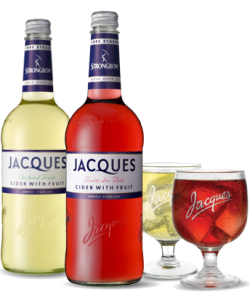
An interesting trend is occurring in the UK. A fast growth in fruit ciders (pear and other non-traditional fruit based ciders) is starting to change the beverage alcohol market landscape.
This article by Guy Montague-Jones of beveragedaily.com explains it well:
Mintel has forecast 45 per cent value growth in the UK cider market over the next five years as new fruit ciders win over drinkers.
Cider has bucked the downward trend in UK alcohol consumption in recent years. The drink has experienced 60 per cent value growth between 2005 and 2010, and is now worth £2.2bn.
Successful marketing and innovation has re-orientated cider towards a young and trendy audience, helping the drink shed its rural, old fashioned image.
Savvy marketing and the development of new flavours are now expected to drive the conquest of new palettes and enable further market expansion.
Market potential
Mintel said the cider segment has rich raw potential for growth, with 10.4 million UK adults prepared to consider drinking it in the future. And the new cider flavours are attracting a strong following.
According to Mintel, there are around 2.3 million cider drinkers – primarily 18-24-year-old women – who are attracted to the newer pear or other fruit ciders but show no interest in drinking traditional variants.
Jonny Forsyth, senior drinks analyst at Mintel, said: “With consumers currently more interested in pear or fruit cider than traditional apple, Mintel forecasts that the cider sector will continue to see impressive growth – of 23 per cent in volume sales – over the next five years.”
That volume growth is expected to translate into value expansion of 45 per cent. But cider can only achieve this with a continued focus on innovation.
Challenges
Forsyth said: “Its major challenge is to stay ahead of the curve on innovation, so as to keep its young audience interested, but this is something it has thus far excelled at.”
Another challenge for the cider industry is to encourage consumers to drink cider more regularly as Mintel said around two-thirds of cider drinkers only have it when they feel like a change.
Forsyth said: “Our research shows that too often people view it as a ‘repertoire drink’ rather than something to drink all night. It also lacks ownership of an occasion for drinking beyond summer days in the pub garden.
“It is therefore crucial that cider builds a stronger association with mealtime occasions now that the UK has more ‘food-led’ pubs than ever, and consumers are adopting a more continental approach to sensible drinking.”
